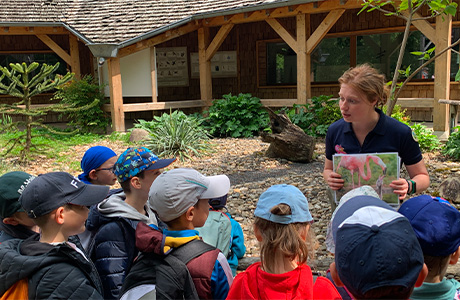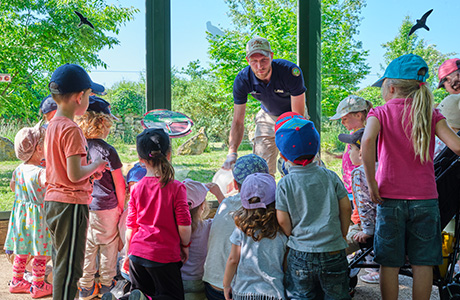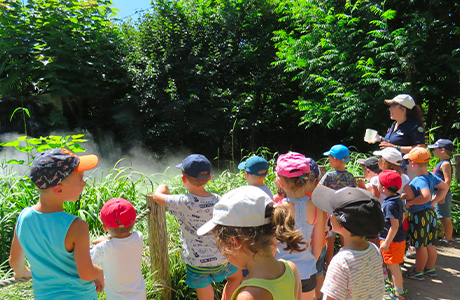The leisure and toursim animator diploma (alt), zoology specialization
Become a zoological educational animator
This training prepares you to obtain the professional title of Leisure and Tourism Facilitator (ALT), a State-recognized Level 4 qualification. It trains you to lead activities for all types of audiences in various reception, animation, and leisure facilities.
The role of the Leisure and Tourism Facilitator is to create a friendly atmosphere, relaxation, entertainment, and discovery for visitors. This diploma prepares versatile facilitators, general animators, evening animators, mini-club leaders, or discovery animators. The training is provided by instructors from the JMSA training organization. To specialize apprentices in zoological educational activities, animal care modules are added and taught by the educational department of Le PAL park. This training therefore allows obtaining a more comprehensive diploma, aligned with the expectations of zoological parks.
This training is divided into 3 periods:
- From January to mid-March: classroom training period, held at Le PAL. During this time, all trainees can be accommodated free of charge (excluding utilities) in cottages.
-
From mid-March to the end of August: apprenticeship period within a facility (at the zoological park that has recruited the trainee).
- From early September to mid-September: training resumes at Le PAL to prepare for the diploma exam, which takes place during the final week of the training.
Learn to lead activities for all types of audiences
Leisure activity modules (385 hours)

Module 1
Design of leisure activities in a tourist establishment
-
Conception d’un projet et d’un programme d’animations loisirs
-
pour différents publics
-
Création d’animations loisirs pour différents publics
-
Promotion d’animations loisirs
Module 2
Organizing Daytime and Evening Activities in a Tourist Establishment
-
Organizing daytime activities for different audiences
-
Organizing evening activities for different audiences
-
Managing the logistics of leisure activities
-
You can find the program description directly on the JMSA training organization's website.
Deepening your animal knowledge with...
Zoological modules (35h)
In order to prepare apprentices for the animation duties assigned to them by the zoo or aquarium that hires them, additional training modules have been added to the program. These are taught by the educational team at Le PAL park, such as:
-
Feeding and diets: an introduction to dietary types and feeding trends
-
Classification of living beings: an overview course on biological classification to help understand this complex concept and explore ways to present it in a fun and accessible manner for children
-
General ecology: an opportunity to discover or revisit the fundamental principles governing ecosystems, interactions between living organisms, and threats to biodiversity
-
Zoological animation: an overview of the different types of activities and programs offered in French zoological parks
-
Zoological ethics: public speaking and debate exercises on topics related to zoological ethics
A practical application !
To gain hands-on experience in zoological animation, a partnership has been established with the national education system and local schools as part of this training. Each facilitator will have the opportunity, in pairs, to visit a local classroom and deliver fun, educational activities they have designed to the students.
 . The objectives
. The objectives
Raise awareness among young children, from nursery to fifth
grade, about biodiversity and the threats it faces.
-
Provide facilitators the opportunity to practice activity creation and
-
animation in front of a real audience.
-
Discover the school audience.
-
Receive concrete feedback from trainers and partner teachers to
-
improve animation practices.
The culmination of this project: all classes are invited to Le PAL free of charge. This gives children the opportunity to discover the animals and issues discussed in class by the facilitators. The apprentices, in turn, have the chance to practice in “real conditions” before starting their season at their own facility.
Feedback from our facilitators
Questions/Answers
Who hires the facilitators participating in the training ?
Each zoo or aquarium hires its own facilitators through an apprenticeship contract. During the training period, all apprentices train at Le PAL. The apprentice is employed by their park and signs a CERFA document (contract) with the Training Organization (JMSA) and their employer.
What is the duration of this apprenticeship contract ?
The training starts in mid-January and the diploma is taken in mid-September. From mid-March to the end of August, each apprentice works in their facility on the tasks assigned by their zoo. This is the minimum duration of the contract. However, the contract offered by the hiring company can begin up to 3 months before the start of training (mid-October) and end no later than 2 months after the exams finish (mid-November).
What is the salary during an apprenticeship contract ?
The apprentice receives a minimum salary that varies only based on their age. The employer is, of course, free to pay more than these minimum amounts.
| Minimum salary | |
| Under 18 years old | 27% of the minimum wage |
| 18 to 20 years old | 43% of the minimum wage |
| 21 to 25 years old | 53% of the minimum wage |
| 26 years old and over | 100% of the minimum wage |
*or the Minimum Conventional Salary (SMC) if it is more favorable.
What are the advantages of an apprenticeship contract ?
An apprenticeship contract offers advantages for both apprentices and companies. First, an apprenticeship leads to a diploma; at the end of this training, you will earn the Leisure Tourism Animator diploma.
For apprentices, it provides a long contract of at least 8 months, instead of just a short season in a zoological park. Additionally, the apprentice’s salary is exempt from employee social security contributions up to 79% of the minimum wage (SMIC). This means the apprentice’s net salary is almost equal to their gross salary (excluding income tax withholding). Thus, an apprentice paid 100% of the SMIC earns approximately €1600 net per month.
The company, for its part, benefits from a government subsidy of €500 per month.
Who pays the apprentice’s salary ?
The company that employs the apprentice pays their salary. The training organization does not play any role in the apprentice’s remuneration.
What is the cost of the training for the apprentice?
The training cost is fully covered by the OPCO of the company employing the apprentice. The apprentice does not have to pay any fees for the training. During the training period at Le PAL, apprentices are housed free of charge near the park. Travel expenses, meals, and housing costs remain the responsibility of the apprentice.
What are the requirements to obtain an apprenticeship contract ?
Apprenticeship contracts are open to young people aged 16 to 29 (under 30) at the start of the apprenticeship. Exceptions exist for those over 30, upon request and with justification of a professional career change, validated by a serious animation project.
What is the role of Le PAL in this training ?
Like all other zoological parks sending apprentices to earn their Leisure Tourism Animator diploma, Le PAL is a client of the training organization. The only difference is that the training is held in the rooms that Le PAL provides to JMSA for the course. Additionally, to cover the animal-related topics in the training, Le PAL’s educational team delivers 35 hours of instruction out of the total 420 hours of classroom training.



